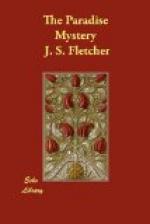The famous Library of the Dean and Chapter of Wrychester was housed in an ancient picturesque building in one corner of the Close, wherein, day in and day out, amidst priceless volumes and manuscripts, huge folios and weighty quartos, old prints, and relics of the mediaeval ages, Ambrose Campany, the librarian, was pretty nearly always to be found, ready to show his treasures to the visitors and tourists who came from all parts of the world to see a collection well known to bibliophiles. And Ambrose Campany, a cheery-faced, middle-aged man, with booklover and antiquary written all over him, shockheaded, blue-spectacled, was there now, talking to an old man whom Bryce knew as a neighbour of his in Friary Lane—one Simpson Barker, a quiet, meditative old fellow, believed to be a retired tradesman who spent his time in gentle pottering about the city. Bryce, as he entered, caught what Campany was just then saying.
“The most important thing I’ve heard about it,” said Campany, “is—that book they found in the man’s suit-case at the Mitre. I’m not a detective—but there’s a clue!”
CHAPTER VI
BY MISADVENTURE
Old Simpson Harker, who sat near the librarian’s table, his hands folded on the crook of his stout walking stick, glanced out of a pair of unusually shrewd and bright eyes at Bryce as he crossed the room and approached the pair of gossipers.
“I think the doctor was there when that book you’re speaking of was found,” he remarked. “So I understood from Mitchington.”
“Yes, I was there,” said Bryce, who was not unwilling to join in the talk. He turned to Campany. “What makes you think there’s a clue—in that?” he asked.
“Why this,” answered the librarian. “Here’s a man in possession of an old history of Barthorpe. Barthorpe is a small market-town in the Midlands—Leicestershire, I believe, of no particular importance that I know of, but doubtless with a story of its own. Why should any one but a Barthorpe man, past or present, be interested in that story so far as to carry an old account of it with him? Therefore, I conclude this stranger was a Barthorpe man. And it’s at Barthorpe that I should make inquiries about him.”
Simpson Harker made no remark, and Bryce remembered what Mr. Dellingham had said when the book was found.
“Oh, I don’t know!” he replied carelessly. “I don’t see that that follows. I saw the book—a curious old binding and queer old copper-plates. The man may have picked it up for that reason—I’ve bought old books myself for less.”
“All the same,” retorted Campany, “I should make inquiry at Barthorpe. You’ve got to go on probabilities. The probabilities in this case are that the man was interested in the book because it dealt with his own town.”
Bryce turned away towards a wall on which hung a number of charts and plans of Wrychester Cathedral and its precincts —it was to inspect one of these that he had come to the Library. But suddenly remembering that there was a question which he could ask without exciting any suspicion or surmise, he faced round again on the librarian.




